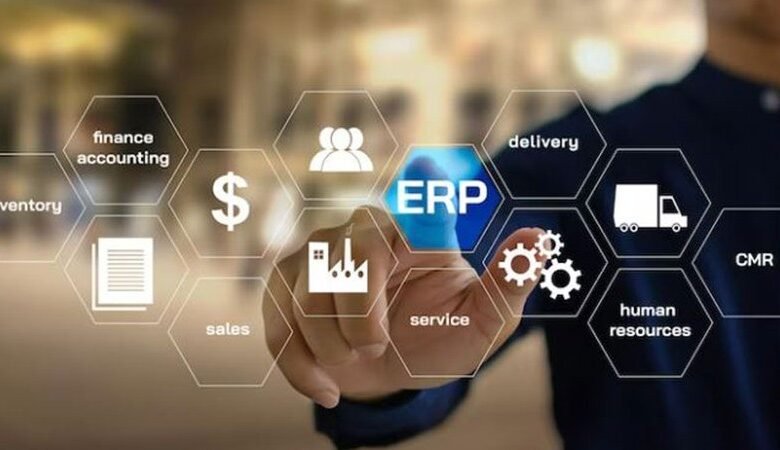Top 10 Best ERP Systems for Growing Businesses in 2025

In 2025, Enterprise Resource Planning (ERP) systems will become indispensable tools for businesses aiming to streamline operations, enhance efficiency, and support scalability. The global ERP software market is projected to reach US 175.6 billion by 2032, driven by the adoption of cloud-based solutions and the integration of AI technologies .
For growing businesses, selecting the best ERP for businesses is crucial to navigate the complexities of expansion and to stay competitive in a dynamic market.
This guide explores the top 10 best ERP systems for businesses in 2025—ranked for usability, scalability, and industry-specific capabilities—to help you find the perfect fit.
1. HAL ERP (Best for End-to-End Business Management)
HAL ERP leads the list in 2025 as the most robust and customizable ERP for small to mid-sized businesses poised for growth. Built with modern, modular architecture, HAL ERP seamlessly integrates modules across finance, supply chain, CRM, HR, and inventory management.
Key Features:
- AI-powered analytics dashboard
- Real-time inventory and warehouse control
- Industry-specific modules (retail, manufacturing, pharma, logistics)
- Seamless mobile and cloud accessibility
Benefits:
- Minimal setup time and easy scaling as you grow
- Custom workflows tailored to your industry
- 24/7 support and active vendor ecosystem
HAL ERP is often referred to as the best ERP for businesses seeking cost-effective customization, especially in emerging markets like India and MENA.
2. SAP Business One (Best for Global Expansion)
SAP Business One remains a top-tier solution for growing businesses aiming for international reach. It offers localized compliance and tax support in over 40 countries.
Key Features:
- Integrated CRM, procurement, and financial management
- Strong localization support for taxes and invoicing
- Embedded business intelligence tools
Benefits:
- Scalable for both small and mid-market businesses
- Backed by SAP’s global infrastructure and security
- Ideal for businesses planning cross-border expansion
3. Oracle NetSuite (Best for Cloud-Based Scalability)
As a pioneer in cloud ERP, Oracle NetSuite offers an all-in-one platform perfect for fast-growing startups and medium-sized enterprises.
Key Features:
- Unified dashboard for financials, ecommerce, and inventory
- Multi-entity and multi-currency support
- Advanced revenue recognition and reporting
Benefits:
- Rapid deployment with low IT overhead
- Strong automation for recurring billing and subscription models
- Scalable as your operations grow in complexity
4. Microsoft Dynamics 365 Business Central (Best for Microsoft Ecosystem Users)
This ERP seamlessly integrates with Microsoft tools like Office 365, Teams, and Azure, making it an excellent choice for tech-savvy businesses.
Key Features:
- Intuitive UI built on Microsoft frameworks
- Integrated Power BI analytics
- Deep CRM and sales pipeline features
Benefits:
- Familiar interface reduces learning curve
- Cloud or on-premise deployment flexibility
- Easily extendable with Microsoft AppSource plugins
5. Zoho ERP (Zoho One) (Best for Affordability and Modular Growth)
Zoho One is an all-in-one suite that includes over 45 business apps, ideal for SMEs needing a low-cost but powerful ERP solution.
Key Features:
- Fully integrated CRM, accounting, HR, and project tools
- AI assistant (Zia) for predictive insights
- Highly modular—scale as you grow
Benefits:
- Budget-friendly for startups
- Unified platform for all core operations
- Strong mobile apps for remote teams
6. Odoo (Best for Open Source Flexibility)
Odoo offers open-source freedom with commercial-grade performance. It’s ideal for companies that want control over customizations and data.
Key Features:
- Modular design—install only what you need
- Community and enterprise editions
- API-rich architecture for easy integration
Benefits:
- Great for tech-enabled businesses
- Strong developer community
- Transparent pricing and no vendor lock-in
7. Infor CloudSuite (Best for Manufacturing and Distribution)
Infor specializes in manufacturing, distribution, and automotive industries with industry-specific CloudSuites.
Key Features:
- Smart factory integration (IoT-enabled)
- Deep demand planning and warehouse automation
- Industry-specific templates (food, fashion, chemicals)
Benefits:
- Reduces lead times and improves supply chain visibility
- Built-in compliance tools for regulated industries
- Strong user interface with embedded analytics
8. TallyPrime (Best for Indian SMBs)
TallyPrime is one of India’s most trusted ERP tools for small businesses, particularly in retail and finance.
Key Features:
- GST-compliant invoicing
- Real-time reporting for cash flow and inventory
- Built-in payroll and tax filing
Benefits:
- Simple setup and low learning curve
- Highly popular among Indian CA firms
- Reliable offline and hybrid deployment
9. Epicor ERP (Best for Discrete Manufacturing)
Epicor is tailor-made for job shops, metal fabrication, and discrete manufacturers looking to digitalize their production.
Key Features:
- MES (Manufacturing Execution System) integration
- Advanced materials planning and scheduling
- Lot traceability and quality control modules
Benefits:
- Precision manufacturing workflows
- Scalable from shop floor to enterprise level
- Strong ROI in capital-intensive industries
10. Syspro (Best for Mid-Market Industrial Firms)
Syspro delivers ERP tools for electronics, plastics, food, and industrial firms. It offers on-premise, cloud, and hybrid models.
Key Features:
- Visual production planning boards
- Inventory and demand forecasting
- Regulatory compliance support (FDA, ISO, etc.)
Benefits:
- Tailored for vertical markets
- Excellent support for complex BOMs and supply chains
- Multi-device access with secure controls
Final Thoughts
Choosing the best ERP system depends on your business’s size, industry, goals, and budget. For growing companies in 2025, aligning ERP capabilities with your specific workflows is non-negotiable. Solutions like HAL ERP, NetSuite, and Dynamics 365 offer end-to-end visibility, automation, and scalability that empower you to drive operational efficiency and growth.
As digital transformation accelerates, investing in the best ERP for businesses today sets you up for long-term agility, better decision-making, and sustained success.




